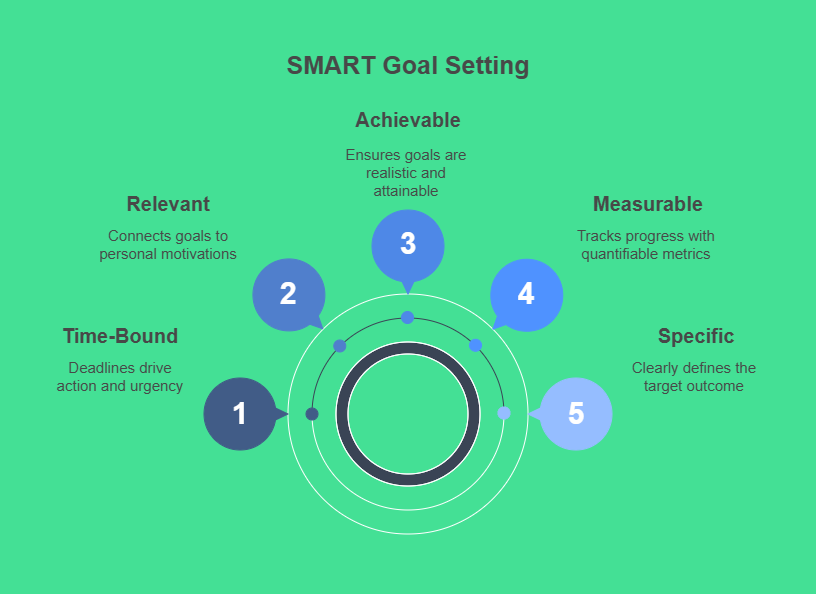Have you ever walked away from a conversation thinking, “Well, that didn’t go as planned”? Or maybe you’ve found yourself in meetings where everyone talks but nothing gets resolved? We’ve all been there. Communication—something we do every day—can sometimes feel like the most complicated skill to master.
It’s frustrating, right? But here’s the good news…
Miscommunication isn’t just awkward—it can destroy relationships, derail projects, and suck the joy out of teamwork. But what if I told you there’s a method to madness? Enter: SMART goals for communication.
In this article, I’ll go into detail about SMART goals for communication that will help you achieve them, and by the end, you’ll have the tools to transform those ‘well, that was awkward’ moments into conversations that actually accomplish what you need them to. So, let’s dive deep into this article.
What Are SMART Goals?
Before we deep-dive into how these magic little goals can revolutionize your relationships and work life, let’s clarify what we’re talking about. After all, we can’t reach a destination if we don’t know where we’re going. So we need to know what SMART goals are.
SMART is an acronym that stands for:
- Specific
- Measurable
- Achievable
- Relevant
- Time-Bound
It’s like giving your communication a GPS. No more getting lost in the fog of vague intentions.

Why Communication Needs SMART Goals
Did you know that effective communication is the backbone of every successful relationship—whether personal or professional? Yet, many of us struggle with it. Do you know why? Because we’re often too vague. We say, ‘Let’s talk better,’ but without a clear goal, how can we expect any real improvement? It’s like trying to navigate a foggy road without a map. And that’s why we need SMART goals. Let’s look at some examples.
The Silent Killer: Vague Communication
Ever told someone, “Let’s communicate better,” and got absolutely nowhere? That’s because “better” is about as helpful as a paper umbrella in a hurricane. Without specificity, communication goals don’t stand a chance.
SMART Goals = Roadmaps for Clarity
Imagine trying to hit a bullseye with your eyes closed. That’s vague communication. SMART goals are like putting on laser-guided vision. You see the target, and you know exactly how to hit it.But what exactly makes a goal SMART? Let’s break it down.
The Benefits of SMART Goals for Communication
So, why go through all this effort to set SMART goals for communication? Simple — the benefits are game-changing. Think of it like tuning a blurry radio station until the sound comes through crystal clear. Suddenly, you’re not just talking—you’re connecting. You’re getting your point across without second-guessing yourself. I’ll outline the benefits of SMART goals for communication below, and by the end, you’ll know exactly how you can benefit right now.
- Clarity: No more vague statements or awkward silences—your message hits home.
- Confidence: When you know exactly what to say and when, you step into conversations like a boss.
- Stronger Relationships: Whether it’s your boss, partner, or bestie—clear communication builds unshakable trust.
- Reduced Stress: Goodbye, overthinking and misunderstandings. SMART goals eliminate the guesswork.
- Productivity Boost: In team settings, communication flows faster and decisions get made quicker.
Bottom line? SMART communication goals are like giving your words a user manual—simple, effective, and impossible to ignore.
Breaking Down SMART: What It Really Means
To make yourself smarter and communicate more effectively, you need to know what SMART means. Sure, you know SMART goals can improve your communication—but what does SMART really mean? Don’t worry, we’re not throwing corporate jargon at you. Each letter has a simple meaning that can help you turn vague talk into clear, confident action. Trust me, once you truly get what SMART means, you’ll never go back to fuzzy goals again. Let’s dive in!

S – Specific: Pinpoint the Target
“Be a better communicator” = meh.
“Ask team members for feedback at the end of each meeting” = chef’s kiss.
Specificity is about cutting the fluff. It’s saying exactly what you’ll do, with no room for guesswork.
M – Measurable: Know When You’ve Hit the Mark
If you can’t measure it, how will you know you’re making progress? Measurable goals let you track your improvement like a Fitbit tracks steps. “Have weekly 15-minute check-ins with my direct reports” gives you a benchmark to work with.
A – Achievable: Keep It Real
Shooting for the stars is great—but don’t aim to become Oprah overnight. Your goal needs to be doable based on your current time, energy, and resources.
R – Relevant: Make It Matter
Why are you improving communication? Is it to boost team performance? Strengthen your marriage? Avoid awkward holiday dinners? Keep it connected to your real-life “why.”
T – Time-Bound: Deadlines Drive Action
A goal without a deadline is just a wish. Adding a timeline creates urgency and prevents the good ol’ “I’ll do it later” trap.
Examples of SMART Goals for Communication
If you really want to level up your communication skills, you don’t just need to think or plan—you have to take action in a SMART way. Let’s see how SMART goals work in real life, from the workplace to personal relationships to conflict resolution. If you’re looking for examples of SMART goals for communication, then you’ve come to the right place! Let’s check them out.
In the Workplace
- “I will send a weekly update email to my team every Friday by 3 PM for the next three months.”
- “I will respond to internal emails within 24 hours on weekdays for the next 30 days.”
In Personal Relationships
- “I will have a 10-minute, uninterrupted talk with my partner every night at 9 PM for the next month.”
- “I will give one verbal affirmation to each of my kids daily for 2 weeks.”
In Conflict Resolution
- “I will practice active listening by paraphrasing the other person’s point during any disagreement at work for the next 10 days.”
- “I will use ‘I’ statements in at least 3 challenging conversations this week.”
How to Set Your Own SMART Communication Goals
You’ve probably heard the term SMART—great! But do you know how this strategy can improve your everyday communication? Whether it’s with your boss, partner, or team? Let’s see how we can create powerful and effective communication goals by setting SMART goals. Here’s a simple 10-step formula for you!
Step-by-Step Goal-Setting Formula

Identify the Problem
What’s not working right now? Are you not being heard in meetings? Struggling to get honest feedback from your partner? Naming the problem is the first step toward solving it. So we need to identify the problem first.
Define Your Intention
What are you hoping to change? Do you want to become a more active listener? Or do you want your team to be more open during check-ins? Get clear about the outcome you want.Then you can succeed.
Write It Down
Thinking it isn’t enough. Write your goal in a notebook, post it on your wall, or keep it in your notes app. Written goals are more likely to stick.
Share It with Someone
Accountability helps. Whether it’s a mentor, friend, or colleague, sharing your goal means someone else is rooting for you—and might check in, too.
Make it Time-Bound – Set Deadlines
Deadlines create urgency. Without them, “I’ll do it later” becomes a tempting excuse. Give your goal a clear timeframe. For example, “I will send weekly feedback emails for the next 3 months,” or “I’ll have a feedback session with my team every Friday at 10 AM.”
Make it Relevant – Why Does This Matter?
Why are you working on your communication skills? Is it to improve your team’s productivity? To have more meaningful conversations at home? Keep your goal tied to a meaningful purpose, so you stay motivated and connected to the bigger picture.
Make it Achievable – Keep It Real
Sure, we all want to be great communicators, but setting unrealistic goals will just set you up for frustration. Make sure the goal is possible with the time, resources, and energy you have. Don’t aim to be the next Oprah overnight—start with manageable steps!
Review and Refine
Your first draft isn’t your last. Revisit your goal weekly. Is it working? Too ambitious? Too vague? Adjust it as needed—because progress beats perfection.
Celebrate Your Wins – Reward Yourself!
Achieving goals is a big deal, even the small ones. When you hit a milestone, take a moment to appreciate your progress. Whether it’s treating yourself to a coffee or simply giving yourself a pat on the back, celebrating small victories keeps you motivated.
Common Mistakes (and How to Dodge Them)
- Too vague? Zoom in tighter.
- Too ambitious? Trim it down.
- Not time-bound? Add a date.
Measuring Success: How to Know If Your Goals Work
Okay, you set a SMART goal—great! But now the question is: is it working?
Communication skills aren’t always easy to measure, so you need to track them smartly. Here, we’re sharing some simple but powerful tools, trackers, and techniques to help you understand whether your communication goals are actually working.
And yes, remember—goals aren’t set in stone. Even if things fluctuate a little over time, getting it right is the real skill!
Tools, Trackers, and Techniques
Use communication journals, feedback forms, or habit trackers. Even a good ol’ sticky note system can work wonders.
Adjust and Adapt: It’s Not Set in Stone
Life changes, so your goals should evolve too. Be flexible but committed.

Real-Life Case Study: From Misfires to Mastery
Let’s talk about Amy, a team lead who kept clashing with her staff. She set a SMART goal: “Hold 10-minute feedback huddles with each team member every Monday for one month.” Results? Better morale, fewer misunderstandings, and a team that actually looked forward to Mondays. Now that’s the SMART life. For even more practical communication techniques and tools, MindTools offers a great resource worth checking out.
FAQs About SMART Goals for Communication
1. What are SMART goals in communication?
They’re structured, goal-oriented approaches that help you communicate more clearly and effectively using the SMART framework.
2. Why is it important to set communication goals?
Because intentional communication prevents misunderstandings, builds trust, and improves relationships.
3. Can SMART goals be used in relationships?
Absolutely! They’re great for setting boundaries, improving listening, and creating emotional connection.
4. What’s an example of a SMART goal for a couple?
Have a 15-minute check-in talk every night at 8 PM for the next 3 weeks.
5. How can SMART goals help at work?
They ensure clarity in expectations, reduce conflict, and improve teamwork.
6. Are SMART goals time-consuming to make?
Not at all. Once you get the hang of the format, it’s fast and intuitive.
7. What’s a good tool to track communication goals?
You can use habit trackers, journals, Trello boards, or even Google Sheets.
8. What if my goal doesn’t work?
Tweak it! Goals are meant to evolve with you.
9.Do SMART goals apply to digital communication too?
Definitely. You can set goals for replying to emails, handling chats, or managing online meetings.
10. Are SMART goals only for leaders?
Nope! Anyone can use them—from interns to CEOs.
All in all of this article
Communication isn’t just what we say—it’s how we connect. And the difference between a scattered mess and a solid message? A good strategy. With SMART goals for communication, you’re not just talking—you’re building bridges, creating bonds, and setting yourself (and others) up for success.
So, ready to turn your words into real impact? Pick one SMART goal today and take that first step—your future self will thank you!
And hey, if you enjoyed this article, feel free to share it on your social media. Who knows—your friends might need this just as much as you did!

